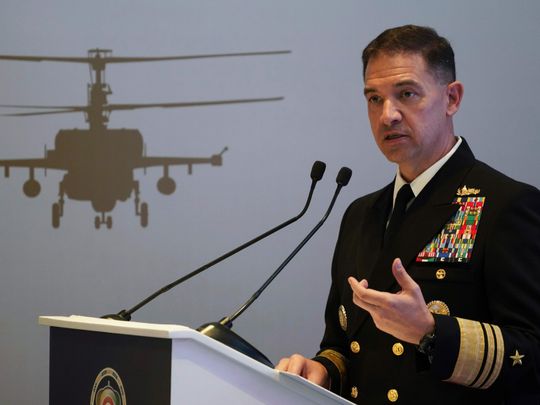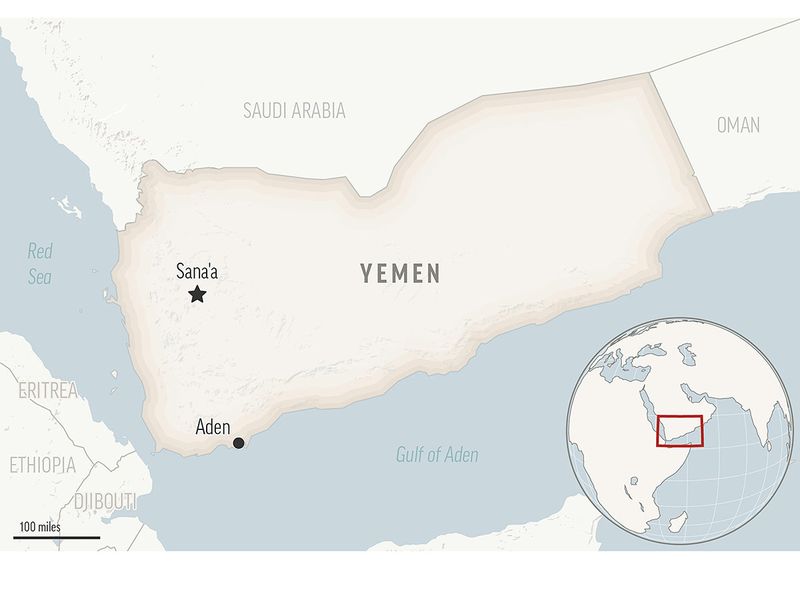
JERUSALEM: Iran is “very directly involved” in ship attacks that Yemen’s Al Houthi militants have carried out during Israel’s war against Hamas, the US Navy’s top Mideast commander told The Associated Press on Monday.
Vice Admiral Brad Cooper, the head of the Navy’s 5th Fleet, stopped short of saying Tehran directed individual attacks by Al Houthis in the Red Sea and the Gulf of Aden.
However, Cooper acknowledged that attacks associated with Iran have expanded from previously threatening just the Arabian Gulf and its Strait of Hormuz into waters across the wider Middle East.
“Clearly, [Al] Houthi actions, probably in terms of their attacks on merchant shipping, are the most significant that we’ve seen in two generations,” he told the AP in a telephone interview.
“The facts simply are that they’re attacking the international community; thus, the international response I think you’ve seen.”
Iran’s mission to the United Nations did not immediately respond to a request for comment on Cooper’s remarks. Al Houthi leadership in Yemen’s capital, Sana’a, could not be immediately reached.
Since November, the Iranian-backed Al Houthis have launched at least 34 attacks on shipping through the waterways leading up to Egypt’s Suez Canal, a vital route for energy and cargo coming from Asia and the Middle East onward to Europe.
Al Houthis, a Shiite militant group that’s held Sana’a since 2014 and been at war with a Saudi-led Arab coalition backing Yemen’s exiled government since 2015, link their attacks to the Israel-Hamas war.
However, the ships they’ve targeted increasingly have tenuous links to Israel — or none at all.
In recent days, the US has launched seven rounds of airstrikes on Al Houthi military sites, targeting air bases under the rebels’ control and suspected missile launch sites.

In fact, 40% of Asia-Europe trade normally goes through the area, including a huge amount of oil and diesel fuel for import-dependent Europe. So do food products like palm oil and grain and anything else brought over on container ships, which is most of the world’s manufactured products.
In all, about 30% of global container traffic and more than 1 million barrels of crude oil per day typically head through the Suez Canal, according to global freight booking platform Freightos Group.
HOW ARE HOUTHI ATTACKS AFFECTING TRADE?
Huge shipping container companies, including Maersk, are avoiding the Red Sea and sending their ships around Africa and the Cape of Good Hope. That adds a week to two weeks to voyages and increases costs for for shipping, fuel and more.
At least 90% of the container ships that had been going through the Suez Canal are now rerouting around the tip of Africa, said Simon Heaney, senior manager of container research for Drewry, a maritime research consultancy.
The cost to ship a standard 40-foot container from China to northern Europe has jumped from $1,500 to $4,000, according to the Kiel Institute for the World Economy in Germany. But that is still far from the $14,000 seen during the pandemic.
The delays contributed to a 1.3% decline in world trade in December, reflecting goods stuck on ships rather than being offloaded in port.
WHAT DOES IT MEAN FOR OIL PRICES?
Crude prices rose about 4% following the US-led airstrikes. International benchmark Brent traded at just over $80 per barrel Friday, still down from about $84 on the eve of the October 7 Hamas attack on Israel.
“While this puts upwards pressure on global oil prices, it is unlikely to represent a serious energy supply shock for now,” Simone Tagliapietra, an energy analyst at the Bruegel think tank in Brussels, tweeted.
That could change if the Hamas-Israel and Al Houthi conflicts escalate and lead to trouble at the Strait of Hormuz at the southern end of the Arabian Gulf, he said.
“That would have massive implications for global energy markets,” Tagliapietra said.
HOW IS THE WORLD RESPONDING?
The US is leading a security initiative to protect ships in the Red Sea that includes United Kingdom, Bahrain, Canada, France, Italy, Netherlands, Norway, Seychelles and Spain. Al Houthis have no navy to impose a cordon, relying on harassing fire and only one helicopter-borne assault so far.
Friday’s strikes killed at least five Al Houthi troops and wounded six, the rebels said, without elaborating on what was targeted. It was unclear how extensive the damage from the US strikes were, though the Houthis said at least five sites, including airfields, had been attacked. -- Reuters
Increased patrols
The tempo of Al Houthi attacks on shipping appears to have slowed for the time being as the US and its allies have increased their naval patrols in the region.
However, risks for the global economy remain as many ships continue to bypass that route for a longer trip around Africa’s southern tip. That’s meant lower revenue for Egypt through the Suez Canal, a vital source of hard currency for the country’s troubled economy, as well as higher costs for shipping that could push up global inflation.
As Cooper took command of the 5th Fleet in 2021, the threat to shipping focused primarily around the Arabian Gulf and its narrow mouth, the Strait of Hormuz, through which a fifth of all oil traded passes.
A series of attacks blamed on Iran and ship seizures by Tehran followed the collapse of Iran’s nuclear deal with world powers.
In his interview with the AP, the Navy commander acknowledged the threat from Iran’s proxies and that its distribution of weapons extended from the Red Sea out to the far reaches of the Indian Ocean.
The US has blamed Iran for recent drone attacks on shipping, and a US-owned cargo vessel came under attack from Al Houthis in the Gulf of Aden last week.
So far, Iran has not directly gotten involved in fighting either Israel or the US since the war in Gaza began on October 7. However, Cooper maintained Iran had been directly fuelling Al Houthi attacks on shipping.
“What I’ll say is Iran is clearly funding, they’re resourcing, they are supplying and they’re providing training,” Cooper said.
“They’re obviously very directly involved. There’s no secret there.”
Cooper described the ship attacks striking the Mideast as the worst since the so-called Tanker War of the 1980s. It culminated in a one-day naval battle between Washington and Tehran, and also saw America accidentally shoot down an Iranian passenger jet, killing 290 people.
Back then, American naval ships escorted reflagged Kuwaiti oil tankers through the Arabian Gulf and the strait after Iranian mines damaged vessels in the region.
Cooper said authorities had no current plans to reflag ships and escort them past Yemen.
Instead, the US and its allies employ a “zone defence, and every once and a while we shift to a one-on-one,” he said.
Cooper’s reference to the tensions from more than three decades ago underlines just how precarious the situation in the wider Mideast has become as worries of a regional conflict over the Israel-Hamas war grow.
Today, a variety of drones provide the 5th Fleet coverage across some 10,000 square miles (25,900 square kilometers) of Mideast waters the Navy otherwise wouldn’t have eyes on, Cooper said. That helps its efforts to interdict suspected drug and weapons shipments.
US forces this month seized Iranian-made missile parts and other weaponry from a ship bound for Al Houthis in a raid that saw two Navy SEALs go missing. The US military’s Central Command said Sunday it now believes the SEALs are dead.
While not directly saying his fleet’s drones played a part in the seizure, Cooper hinted at it.
“They are specifically designed to conduct interdiction operations,” he said. He added: “There’s no squeaking anything by it.”
Cooper’s command is set to end in February with the upcoming arrival of Rear Admiral George Wikoff in Bahrain. He noted the Navy and merchant shippers still face a serious threat from the Houthis as he prepares to leave.
“What we need is a Houthi decision to stop attacking international merchant ships. Period,” Cooper said.












